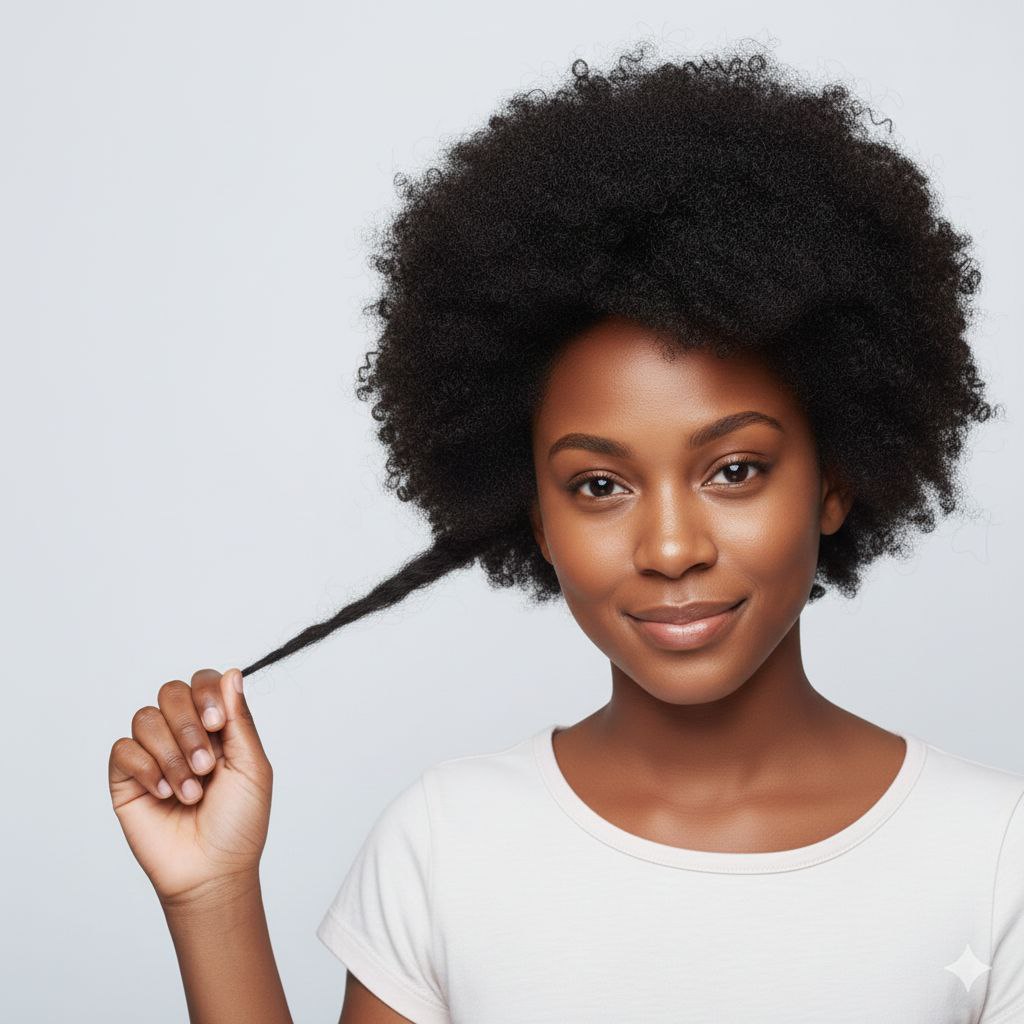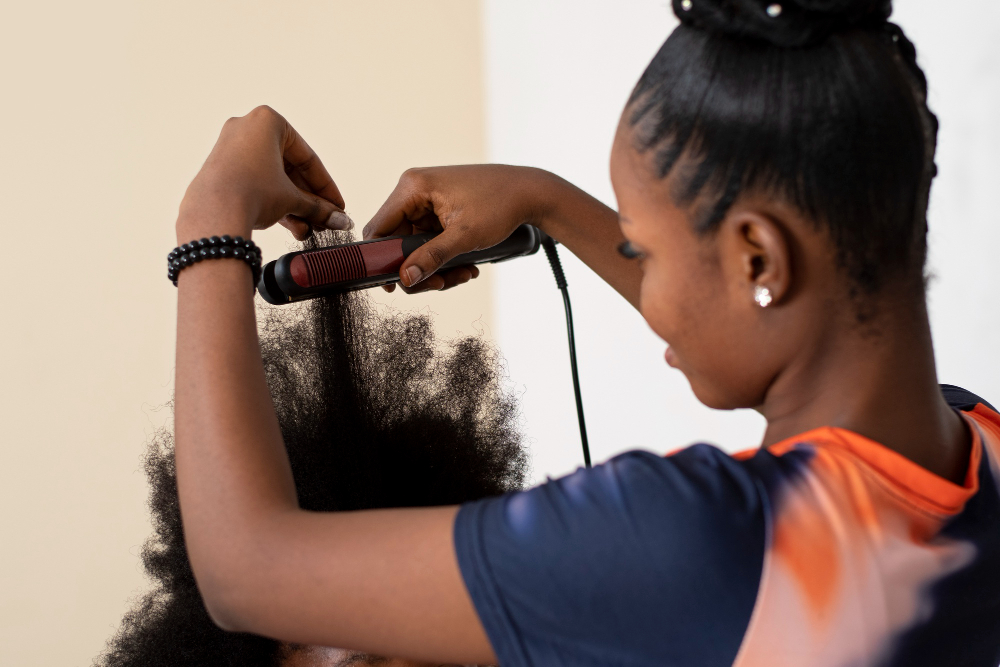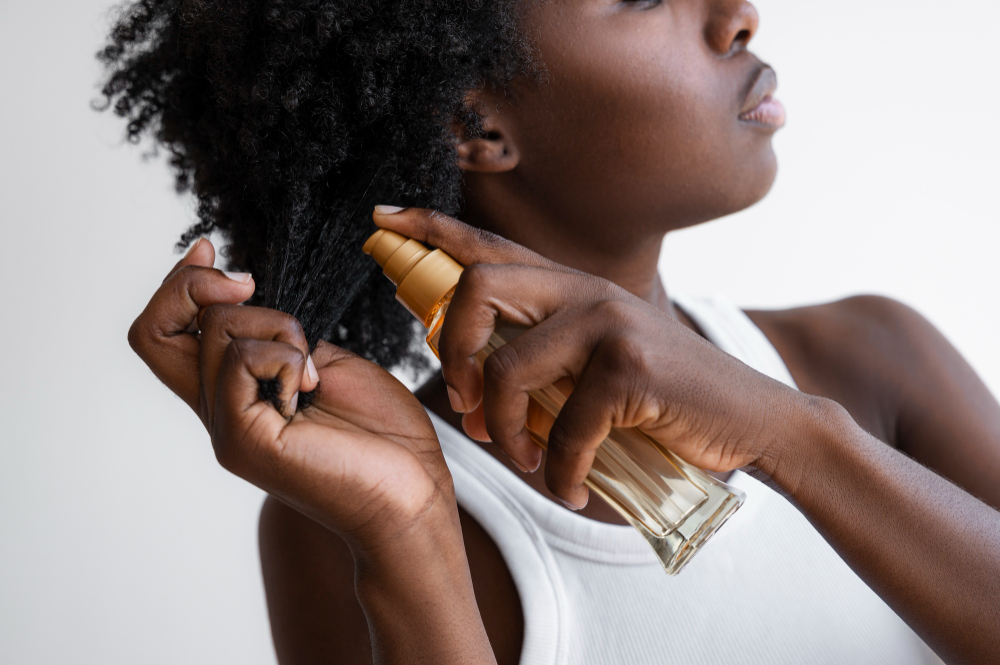Trending Article · 15 mins read
Tips to Strengthen and Revitalize Hair Thinning in Type 4B/4C Hair
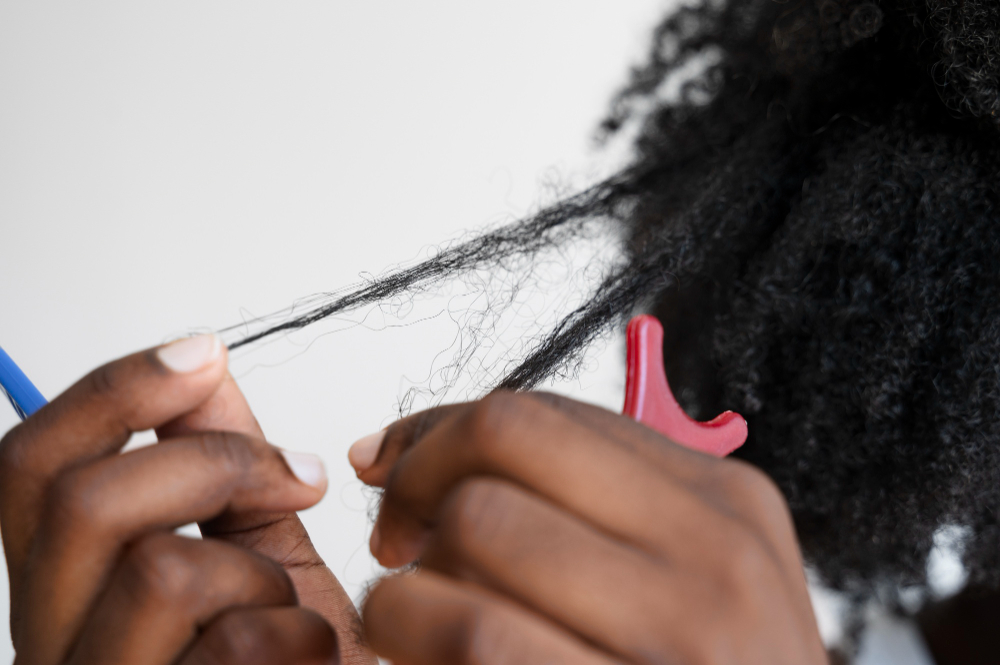
Nobody enjoys seeing their once full and luscious hair gradually lose its luster, become thin and sometimes sparse.
Hair thinning can be very distressing and sad. In this article, we'll explain clearly what hair thinning means, possible reasons for hair thinning and helpful tips to strengthen your hair.
Let's begin.
What is Hair Thinning?
Hair thinning is a slow process where the diameter of your hair shaft grows thinner with each regrowth cycle*. As the hair shaft's diameter grows thinner, it's thinner when hair grows out.
You might notice this easily when the density of your hair seems to be reducing. If you notice this, the best action is to visit a Trichologist or dermatologist to find the cause.
A lot of people interchange hair thinning with hair loss. Are they the same? No. But hair thinning can lead to hair loss, or even more seriously, balding.
Hair regrowth cycle explained
Hair regrowth cycle has 3 phases. They are:
- Anagen (Growth phase): This is the party time! Your hair grows actively for a few years (2-8 years to be exact). This is when your hair gets longer, about half an inch a month.
- Catagen (Transition phase): Time to slow down. This short phase (about 2-4 weeks) is like your hair packing its bags and getting ready for the next stage. Growth starts to slow way down.
- Telogen (Resting phase): Hair takes a break for a few months (2-4 months) here. The hair follicle chills out and doesn't grow new hair. This is also when hair naturally falls out, but don't worry, new hair is usually waiting to take its place and start the journey again!
Let’s imagine your hair strands are like colorful straws. Normally, each new hair that grows out of the strand is just as wide, or has the same diameter, as the one it replaces (telogen phase).
But with hair thinning, the cycle gets disrupted. The new hair growth might have a slightly smaller diameter than the previous hair. It's like the new straw is a bit narrower.
Over time, this adds up. Even a small difference in diameter with each growth cycle (anagen) can lead to noticeably thinner hair overall. This is because the new, thinner hairs aren't replacing the older, thicker ones at the same rate they're being shed during the resting phase (telogen).
What Causes Hair Thinning?
1. Age
The hair shaft just like every other body part loses its vitality with age. That's why the hair shaft can become thinner and gradually hair density reduces (just as we mentioned earlier).
As men and women grow older, they can notice hair thinning. Although some might experience it earlier than others but usually from age 40 and above, you might notice your hair thinning.
2. Hormone imbalance
The male hormone, androgen, can be a cause for hair thinning. Though found in men, women also carry this hormone.
When there are high levels of androgen in your body, it can cause hair thinning which could eventually lead to a form of hair loss called androgenic alopecia.
Conditions that cause hormonal imbalance like:
- polycystic ovary syndrome (PCOS),
- thyroid disorders,
- pregnancy,
- menopause, etc., can cause hair thinning.
3. Mineral and vitamin deficiency
A protein called keratin is a major building block for hair. (That's why you notice some protein deep conditioners have it as an ingredient)
When your body doesn’t get enough protein, it uses the available proteins for important body functions first, hair growth is no longer a priority, and this could lead to hair thinning.
A deficiency in nutrients like zinc, iron, vitamin B, D, E and A can also lead to hair thinning.
4. Bad hair practices
Some bad hair practices can predispose your hair to thinning. In some extreme cases, hair loss and balding.
Tight and heavy braid styles can cause hair thinning, which can lead to a form of hair loss called traction alopecia.
Extreme heat styling methods over time can result in hair thinning. Overprocessing your hair with dyes, products containing harsh chemicals like sulfates, can cause hair thinning.
Now that we know the causes of hair thinning, let's find out tips to strengthen and revitalize your thinning hair.
Tips to Strengthen Thinning Hair
Tip 1: Visit a trichologist
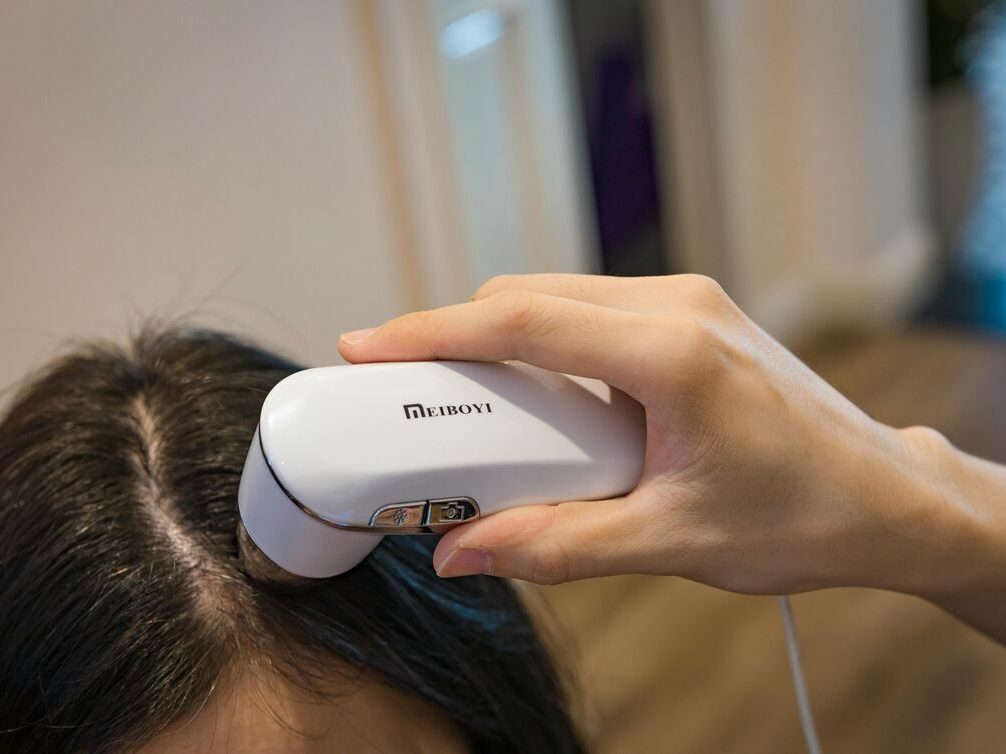
Yes, it's highly recommended to visit a professional to ensure that thinning hair is not a sign of serious health issues. Additionally, a trained medical specialist can give you personalized recommendations and prescribe drugs based on the tests carried out on your hair.
Once it's clear that there are no severe underlying health issues, then you can move onto the next tips.
Tip 2: Good nutrition can reduce hair thinning
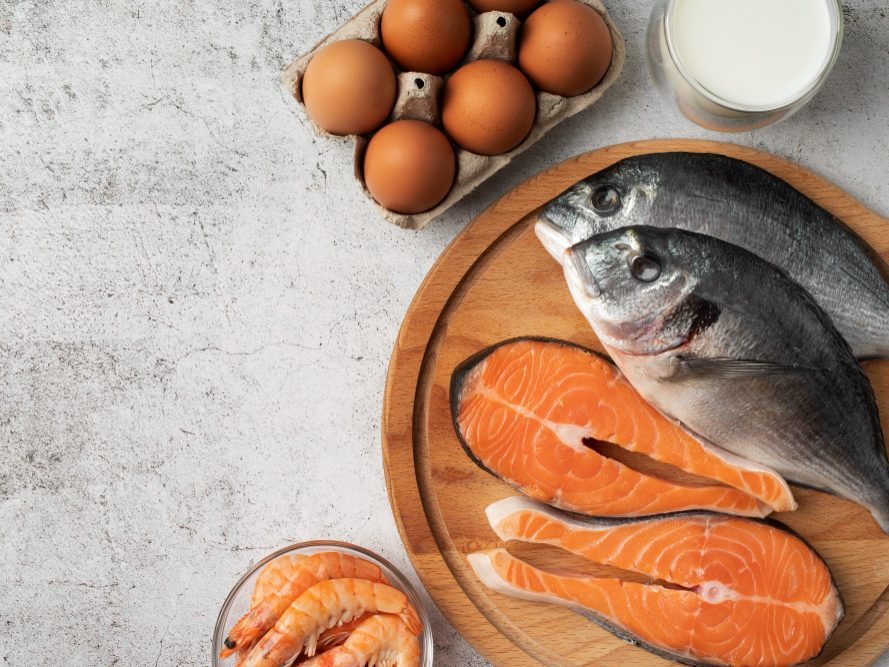
Eating healthy is a sure way to supply your body and, by extension, your hair with the right nutrients it needs to grow.
Proteins help to strengthen and reconstruct damaged hair strands. Increase your protein levels, eat protein-rich foods like
- Tofu
- Chicken
- Lean beef
- Soy beans
- Lentils
- Chickpeas
- Eggs
- Fish and Nuts
Eat other foods and fruits rich in iron, zinc, and vitamin B. These nutrients help supply oxygen to the hair follicles and promote cell tissue and follicle growth rate.
3. Supplements can help with thinning hair

Women with thinning hair in a small 2015 study were given a protein supplement to take twice a day for a 90-day period. In the end, researchers found this extra protein supplement promoted hair growth.
Hair supplements can give the body nutrients needed for better hair growth. Some supplements, like Biotin, can be bought over the counter but it's better to see a doctor first before purchasing supplements.
4. Better hair care practices

Extreme heat styling or product use might be stressing your hair strands; now would be a great time to reduce these practices or cut them off completely.
If you use high-heat or extreme hair-hold products to achieve sleek hairstyles, consider using lower-heat temperatures.
You can also use a scarf to achieve sleek hairstyles. After styling (maybe a low bun or a pineapple updo), tie a scarf over the portion you want to flatten for about 5-10 minutes.
After taking it off, you'd still achieve a flat and sleek hairstyle (If you have time, maybe if you're styling overnight, you can leave the scarf on longer)
5. Scalp massages stimulate hair growth
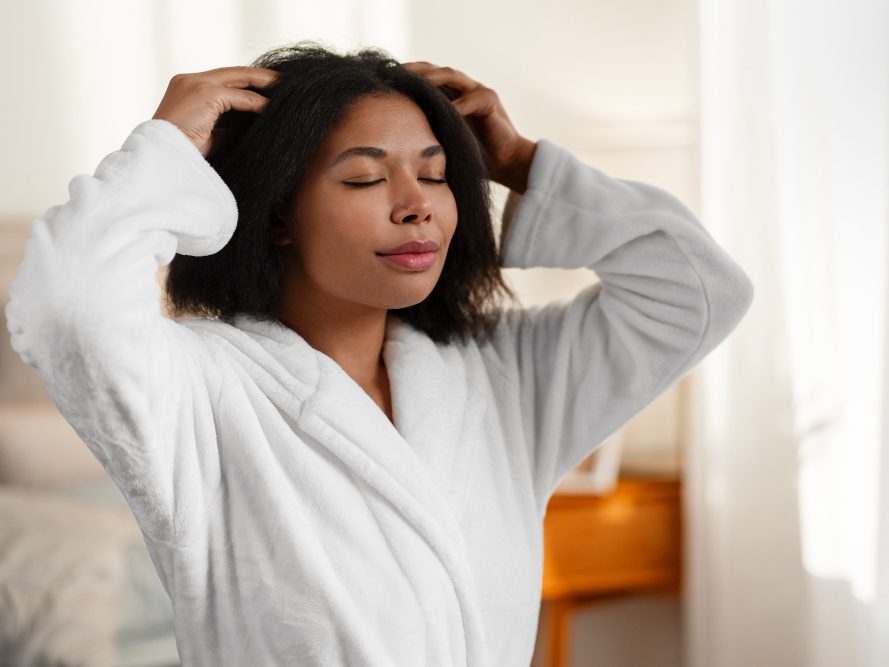
Apart from being a huge relaxing experience, scalp massages can help increase blood flow to the scalp and stimulate better hair follicle growth.
Use the pads of your fingers and apply light pressure to your scalp. You can use a handheld scalp massager if you prefer.
Feel free to mix or dilute drops of essential oils like rosemary, peppermint, or lavender with a carrier oil, such as coconut, avocado, or jojoba, to massage your scalp.
6. Lifestyle Changes
Lifestyle factors like smoking are linked to hair loss. If you smoke, you might want to consider quitting.
You also want to reduce your stress levels. Sometimes stress is unavoidable, but prolonged stress is not great for the body, including your hair.
So, if you have a stress-filled routine, you might have to find ways to reduce your stress levels, which in turn can boost your hair's appearance.
To reduce stress, engaging in yoga, dancing, reading, gardening, physical exercise and creating a better sleep routine can have a good effect on your health and by extension your hair.
Wrapping Up
If your hair thinning is caused by age or other health conditions, follow the prescription and recommendations of your doctor. If pregnancy and postpartum are the causes of your hair thinning, be patient with your body as it gradually comes back to normal. You've just experienced a beautiful journey by birthing a human; give yourself and your hair time to heal.
Hair thinning can be a long process to recover from but as always, hair care requires patience, and consistency. Eat well, use recommended products and make lifestyle or hairstyle changes where necessary.
You don't have to do your journey alone, The Hair Talk community is always here to support you. Join the community.

